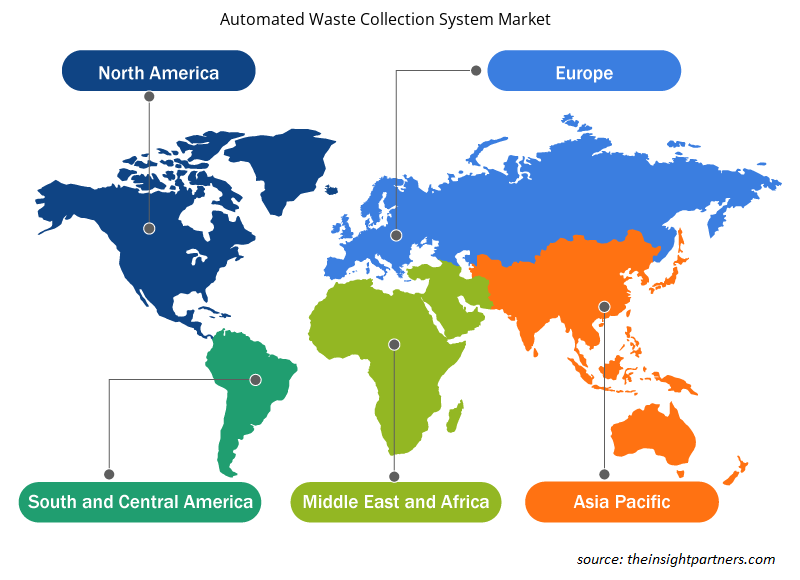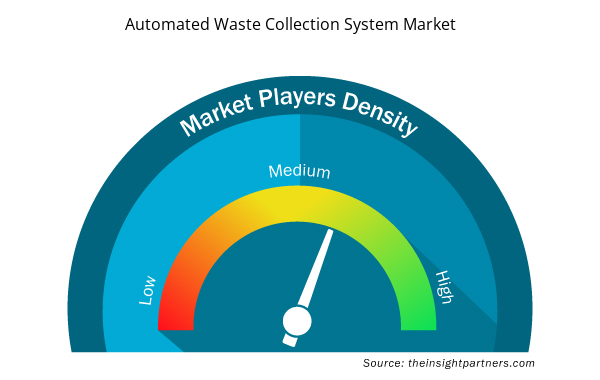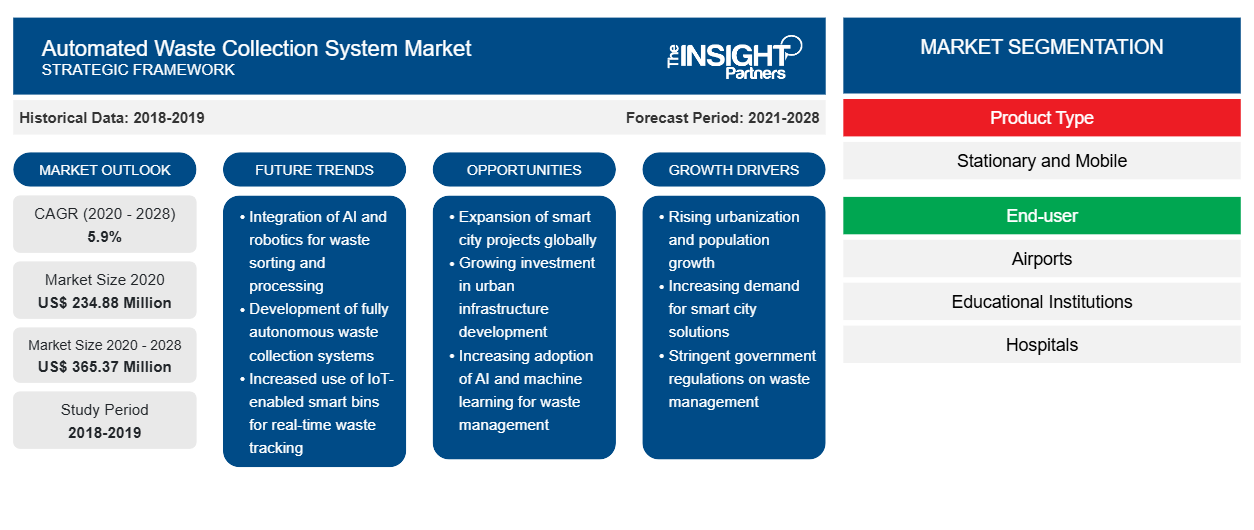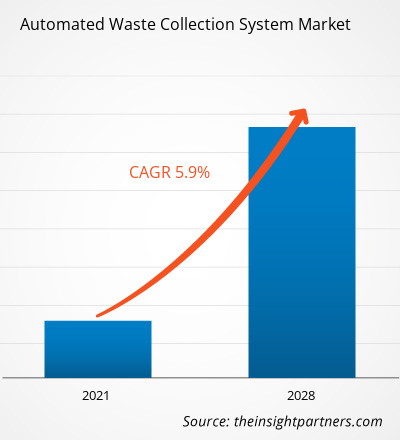자동 폐기물 수거 시스템 시장 규모는 2020년에 2억 3,488만 달러로 평가되었으며, 2028년까지 3억 6,537만 달러에 도달할 것으로 예상됩니다. 2021~2028년 동안 연평균 성장률 5.9%로 성장할 것으로 예상됩니다.
자동 폐기물 수거 시스템 시장을 움직이는 핵심 요인은 폐기물의 적절한 처분을 위한 정부 이니셔티브입니다. 전 세계의 정부 기관은 폐기물 수거 및 분리에 대한 규칙과 규정을 부과했습니다. 예를 들어, 인도 정부는 출처에서 폐기물 분리를 강조하는 새로운 고형 폐기물 관리 규칙을 지정했습니다. 새로운 규정은 폐기물을 회수, 재사용 및 재활용을 통해 자본으로 전환하기 위해 출처에서 분리해야 합니다. 따라서 폐기물을 수거업체에 넘기기 전에 폐기물 발생자는 폐기물을 생분해성, 건조(플라스틱, 종이, 금속, 목재 등), 가정용 유해 폐기물(기저귀, 냅킨, 모기 퇴치제, 세척제 등)의 세 가지 흐름으로 분류해야 합니다. 그러나 대규모 폐기물 분리는 지루한 과정으로, 정부 당국은 폐기물 분리의 자동 솔루션에 집중해야 합니다. 이러한 요인은 전 세계 많은 국가에서 자동 폐기물 수거 시스템 도입에 영향을 미치고 있습니다.
귀하의 요구 사항에 맞게 이 보고서를 사용자 정의하세요
이 보고서의 일부 또는 국가 수준 분석, Excel 데이터 팩을 포함하여 모든 보고서에 대한 사용자 정의를 무료로 받을 수 있으며 신생 기업 및 대학을 위한 훌륭한 혜택과 할인 혜택을 이용할 수 있습니다.
- 이 보고서의 주요 시장 동향을 알아보세요.이 무료 샘플에는 시장 동향부터 추정 및 예측까지 다양한 데이터 분석이 포함됩니다.
COVID-19 팬데믹이 자동 폐기물 수거 시스템 시장에 미치는 영향
그러나 전 세계의 자동 폐기물 수거 시스템 제조업체는 지역 및 지방 정부가 지자체와 민간 기관이 스마트하고 지능적인 폐기물 또는 쓰레기 수거 및 분류 솔루션에 투자하도록 장려함에 따라 제한적인 진동을 경험했습니다. 주거용 폐기물 양이 상당히 증가함에 따라 주거 부문에서 자동 폐기물 수거 시스템에 대한 수요가 급증했습니다. 그러나 인간의 이동 제한으로 인해 공급망이 중단되어 미국, 캐나다, 영국, 이탈리아, 중국과 같은 선진국과 개발도상국에서 AWCS의 배포 및 설치가 더디게 진행되었습니다. 이는 글로벌 자동 폐기물 수거 시스템 시장 에서 평소보다 느린 매출 성장 추세에 따른 것입니다.
시장 통찰력 - 자동 폐기물 수집 시스템 시장
자동 폐기물 수거 시스템 통합에 대한 투자 증가
자동화된 폐기물 수거 시스템은 의료 기관 전반에서 높은 선호도를 보이고 있습니다. 폐기물 관리 및 수거 시스템은 밀폐된 전용 파이프 네트워크를 통해 환자 층의 적재 스테이션에서 중앙 수거 작업으로 시속 60마일의 속도로 재료를 옮깁니다. 폐기물, 퇴비 및 오염된 린넨을 적절한 수거함으로 옮기는 데 별도의 경로가 사용됩니다. 이로 인해 호텔, 의료 및 소매와 같은 산업에서 자동 수거 기술에 대한 투자가 증가하고 있습니다. 예를 들어, Logiwaste AB는 스톡홀름의 카롤린스카 병원에 세 가지 다른 자동 폐기물 수거 시스템을 공급했습니다. 이러한 시스템은 잔여 폐기물, 종이, 플라스틱 및 종이 포장재의 네 가지 다른 유형의 폐기물을 관리할 것으로 예상됩니다. Logiwaste AB는 또한 Trondheim의 Tiller Öst, Karlstad Central Hospital, Trondheim의 Grilstad Marina 및 Beijing의 China Life와 AWCS를 공급하는 계약을 체결했습니다. 마찬가지로 Atreo는 Parkland Hospital, Humber River Hospital, Brigham and Women's Hospital, University of Texas Southwestern Medical Center 등에 AWCS를 공급하는 프로젝트를 수주했습니다. 따라서 다양한 산업, 특히 의료 분야의 조직에서 자동 폐기물 수거 및 관리 시스템을 구현하기 위한 투자가 증가함에 따라 향후 몇 년 동안 시장 성장이 촉진될 것으로 예상됩니다.
제품 유형 기반 통찰력
제품 유형에 따라 자동 폐기물 수거 시스템 시장은 고정형과 이동형으로 세분화됩니다. 고정형 세그먼트는 2020년에 더 큰 시장 점유율을 차지했습니다.
콘텐츠 품질 기반 통찰력
최종 사용자를 기준으로, 자동 폐기물 수거 시스템 시장은 공항, 교육 기관, 병원, 기업 사무실, 호텔/레스토랑 등으로 세분화됩니다. 공항 부문은 예측 기간 동안 가장 높은 CAGR을 기록할 것으로 예상됩니다.
자동 폐기물 수거 시스템 시장에서 활동하는 업체는 주로 첨단적이고 효율적인 제품 개발에 주력하고 있습니다.
- 2021년, Caverion은 생명공학 회사 Thermo Fisher Scientific Baltics의 신축 건물에 대한 턴키 프로젝트를 시행했습니다. 이 프로젝트는 리투아니아 빌니우스에서 진행되었습니다.
- 2021년, 스타방에르 대학 병원은 Logiwaste AB의 자동 폐기물 및 세탁물 수거를 선택했습니다. 이 시스템은 입구 문에서 터미널까지 폐기물과 세탁물을 처리하는 사용자 친화적이고 효율적이며 위생적인 방법을 제공합니다.
자동 폐기물 수집 시스템 시장 지역 통찰력
Insight Partners의 분석가들은 예측 기간 동안 자동 폐기물 수거 시스템 시장에 영향을 미치는 지역적 추세와 요인을 철저히 설명했습니다. 이 섹션에서는 북미, 유럽, 아시아 태평양, 중동 및 아프리카, 남미 및 중미의 자동 폐기물 수거 시스템 시장 세그먼트와 지리에 대해서도 설명합니다.

- 자동 폐기물 수집 시스템 시장에 대한 지역별 특정 데이터를 얻으십시오
자동 폐기물 수집 시스템 시장 보고서 범위
| 보고서 속성 | 세부 |
|---|---|
| 2020년 시장 규모 | 2억 3,488만 달러 |
| 2028년까지 시장 규모 | 3억 6,537만 달러 |
| 글로벌 CAGR (2020-2028) | 5.9% |
| 역사적 데이터 | 2018-2019 |
| 예측 기간 | 2021-2028 |
| 다루는 세그먼트 | 제품 유형별
|
| 포함된 지역 및 국가 | 북아메리카
|
| 시장 선도 기업 및 주요 회사 프로필 |
|
시장 참여자 밀도: 비즈니스 역학에 미치는 영향 이해
자동 폐기물 수거 시스템 시장은 소비자 선호도의 변화, 기술 발전, 제품의 이점에 대한 인식 증가와 같은 요인으로 인해 최종 사용자 수요가 증가함에 따라 빠르게 성장하고 있습니다. 수요가 증가함에 따라 기업은 제품을 확장하고, 소비자의 요구를 충족하기 위해 혁신하고, 새로운 트렌드를 활용하여 시장 성장을 더욱 촉진하고 있습니다.
시장 참여자 밀도는 특정 시장이나 산업 내에서 운영되는 회사나 기업의 분포를 말합니다. 주어진 시장 공간에 얼마나 많은 경쟁자(시장 참여자)가 존재하는지 그 규모나 총 시장 가치에 비해 나타냅니다.
자동 폐기물 수거 시스템 시장에서 운영되는 주요 회사는 다음과 같습니다.
- 에르빈 APS
- AMCS 그룹
- 카베리온 코퍼레이션
- 엔백 AB
- 로지웨이스트 AB
면책 조항 : 위에 나열된 회사는 어떤 특별한 순서에 따라 순위가 매겨지지 않았습니다.

- 자동 폐기물 수거 시스템 시장 주요 업체 개요를 알아보세요
자동 폐기물 수거 시스템 시장은 다음과 같이 세분화됩니다.
자동 폐기물 수집 시스템 시장 – 제품 유형별
- 변화 없는
- 이동하는
자동 폐기물 수집 시스템 시장 – 최종 사용자별
- 공항
- 교육기관
- 병원
- 기업 사무실
- 호텔 / 레스토랑
- 기타
자동 폐기물 수집 시스템 시장 – 지리별
북아메리카
- 우리를
- 캐나다
- 멕시코
유럽
- 독일
- 프랑스
- 이탈리아
- 영국
- 러시아 제국
- 유럽의 나머지 지역
아시아 태평양(APAC)
- 호주
- 중국
- 인도
- 일본
- 대한민국
- APAC의 나머지 지역
중동 및 아프리카(MEA)
- 사우디 아라비아
- 아랍에미리트
- MEA의 나머지
남미(SAM)
- 브라질
- SAM의 나머지
회사 프로필
- 에르빈 ApS
- AMCS 그룹
- 카베리온 코퍼레이션
- 엔백 AB
- 로지웨이스트 AB
- 마리매틱 오이
- 메이코
- 에바크 그룹
- 마바트
- STREAM 환경
- 역사적 분석(2년), 기준 연도, CAGR을 포함한 예측(7년)
- PEST 및 SWOT 분석
- 시장 규모 가치/양 - 글로벌, 지역, 국가
- 산업 및 경쟁 환경
- Excel 데이터 세트


- Joint Pain Injection Market
- Artwork Management Software Market
- Parking Management Market
- Sexual Wellness Market
- Skin Tightening Market
- Machine Condition Monitoring Market
- Water Pipeline Leak Detection System Market
- Third Party Logistics Market
- Europe Surety Market
- Authentication and Brand Protection Market

Report Coverage
Revenue forecast, Company Analysis, Industry landscape, Growth factors, and Trends

Segment Covered
This text is related
to segments covered.

Regional Scope
North America, Europe, Asia Pacific, Middle East & Africa, South & Central America

Country Scope
This text is related
to country scope.
자주 묻는 질문
Automated waste collection systems are being highly preferred across healthcare institutions. The waste management and collection systems transfer materials at 60 miles per hour through a sealed, dedicated pipe network from loading stations on patient floors to a central collection operation. Separate paths are used to move waste, compost, and soiled linen to the appropriate collection bins. This is leading to the rise in investments in automatic collection technologies in industries such as hospitality, healthcare, and retail. For instance, Logiwaste AB has supplied three different automatic waste collection systems to Karolinska Hospital, Stockholm. These systems are projected to manage four different type of waste, namely, residual waste, paper, plastic, and paper packaging. Logiwaste AB has also won contracts from Tiller Öst, Trondheim; Karlstad Central Hospital; Grilstad Marina, Trondheim; and China Life, Beijing, to supply AWCS. Similarly, Atreo has received projects for supplying AWCS to Parkland Hospital, Humber River Hospital, Brigham and Women’s Hospital, and the University of Texas Southwestern Medical Center, among others. Thus, the rising investments by organizations from different industries, especially healthcare, to implement automatic waste collection and management systems is expected to fuel the growth of the market in the coming years.
Government bodies across the world have imposed rules and regulations for the collection and segregation of waste. For instance, the Government of India has specified new solid waste management rules emphasizing on the segregation of waste at source. The new regulations require waste to be separated at the source to channel it into capital through recovery, reuse, and recycling. Therefore, before handing over waste to the collectors, waste generators must sort it into three streams—biodegradables, dry (plastic, paper, metal, wood, etc.), and domestic hazardous waste (diapers, napkins, mosquito repellants, cleaning agents, etc.). However, the segregation of waste at a high scale is a tedious process, which is compelling government authorities to focus on automatic solutions of waste segregation. These factors are influencing the adoption of automated waste collection systems in many countries worldwide.
The stationary segment led the market in 2019 with highest share and is expected to continue its dominance during the forecast period. In stationary waste collection systems, the garbage is directly transported by pipes with the help of air pressure where it is compressed in seal containers. Thus, it is not required to be collected by trucks. Exhausters produce negative pressure in the pipe system, allowing air to flow freely. At ambient pressure, air enters the pipes, collecting the solid waste and carrying it to the collection station. The automated stationary waste collection systems can manage multiple waste forms simultaneously. In a standard collection method, two to four different waste streams are managed using the same transport pipes network.
Trends and growth analysis reports related to Manufacturing and Construction : READ MORE..
The List of Companies - Automated Waste Collection System Market
- Aerbin APS
- AMCS Group
- Caverion Corporation
- Envac AB
- Logiwaste AB
- Marimatic OY
- MEIKO
- EVAC GmbH
- MBAT
- Stream Environment
The Insight Partners performs research in 4 major stages: Data Collection & Secondary Research, Primary Research, Data Analysis and Data Triangulation & Final Review.
- Data Collection and Secondary Research:
As a market research and consulting firm operating from a decade, we have published and advised several client across the globe. First step for any study will start with an assessment of currently available data and insights from existing reports. Further, historical and current market information is collected from Investor Presentations, Annual Reports, SEC Filings, etc., and other information related to company’s performance and market positioning are gathered from Paid Databases (Factiva, Hoovers, and Reuters) and various other publications available in public domain.
Several associations trade associates, technical forums, institutes, societies and organization are accessed to gain technical as well as market related insights through their publications such as research papers, blogs and press releases related to the studies are referred to get cues about the market. Further, white papers, journals, magazines, and other news articles published in last 3 years are scrutinized and analyzed to understand the current market trends.
- Primary Research:
The primarily interview analysis comprise of data obtained from industry participants interview and answers to survey questions gathered by in-house primary team.
For primary research, interviews are conducted with industry experts/CEOs/Marketing Managers/VPs/Subject Matter Experts from both demand and supply side to get a 360-degree view of the market. The primary team conducts several interviews based on the complexity of the markets to understand the various market trends and dynamics which makes research more credible and precise.
A typical research interview fulfils the following functions:
- Provides first-hand information on the market size, market trends, growth trends, competitive landscape, and outlook
- Validates and strengthens in-house secondary research findings
- Develops the analysis team’s expertise and market understanding
Primary research involves email interactions and telephone interviews for each market, category, segment, and sub-segment across geographies. The participants who typically take part in such a process include, but are not limited to:
- Industry participants: VPs, business development managers, market intelligence managers and national sales managers
- Outside experts: Valuation experts, research analysts and key opinion leaders specializing in the electronics and semiconductor industry.
Below is the breakup of our primary respondents by company, designation, and region:

Once we receive the confirmation from primary research sources or primary respondents, we finalize the base year market estimation and forecast the data as per the macroeconomic and microeconomic factors assessed during data collection.
- Data Analysis:
Once data is validated through both secondary as well as primary respondents, we finalize the market estimations by hypothesis formulation and factor analysis at regional and country level.
- Macro-Economic Factor Analysis:
We analyse macroeconomic indicators such the gross domestic product (GDP), increase in the demand for goods and services across industries, technological advancement, regional economic growth, governmental policies, the influence of COVID-19, PEST analysis, and other aspects. This analysis aids in setting benchmarks for various nations/regions and approximating market splits. Additionally, the general trend of the aforementioned components aid in determining the market's development possibilities.
- Country Level Data:
Various factors that are especially aligned to the country are taken into account to determine the market size for a certain area and country, including the presence of vendors, such as headquarters and offices, the country's GDP, demand patterns, and industry growth. To comprehend the market dynamics for the nation, a number of growth variables, inhibitors, application areas, and current market trends are researched. The aforementioned elements aid in determining the country's overall market's growth potential.
- Company Profile:
The “Table of Contents” is formulated by listing and analyzing more than 25 - 30 companies operating in the market ecosystem across geographies. However, we profile only 10 companies as a standard practice in our syndicate reports. These 10 companies comprise leading, emerging, and regional players. Nonetheless, our analysis is not restricted to the 10 listed companies, we also analyze other companies present in the market to develop a holistic view and understand the prevailing trends. The “Company Profiles” section in the report covers key facts, business description, products & services, financial information, SWOT analysis, and key developments. The financial information presented is extracted from the annual reports and official documents of the publicly listed companies. Upon collecting the information for the sections of respective companies, we verify them via various primary sources and then compile the data in respective company profiles. The company level information helps us in deriving the base number as well as in forecasting the market size.
- Developing Base Number:
Aggregation of sales statistics (2020-2022) and macro-economic factor, and other secondary and primary research insights are utilized to arrive at base number and related market shares for 2022. The data gaps are identified in this step and relevant market data is analyzed, collected from paid primary interviews or databases. On finalizing the base year market size, forecasts are developed on the basis of macro-economic, industry and market growth factors and company level analysis.
- Data Triangulation and Final Review:
The market findings and base year market size calculations are validated from supply as well as demand side. Demand side validations are based on macro-economic factor analysis and benchmarks for respective regions and countries. In case of supply side validations, revenues of major companies are estimated (in case not available) based on industry benchmark, approximate number of employees, product portfolio, and primary interviews revenues are gathered. Further revenue from target product/service segment is assessed to avoid overshooting of market statistics. In case of heavy deviations between supply and demand side values, all thes steps are repeated to achieve synchronization.
We follow an iterative model, wherein we share our research findings with Subject Matter Experts (SME’s) and Key Opinion Leaders (KOLs) until consensus view of the market is not formulated – this model negates any drastic deviation in the opinions of experts. Only validated and universally acceptable research findings are quoted in our reports.
We have important check points that we use to validate our research findings – which we call – data triangulation, where we validate the information, we generate from secondary sources with primary interviews and then we re-validate with our internal data bases and Subject matter experts. This comprehensive model enables us to deliver high quality, reliable data in shortest possible time.


 이 보고서에 대한 무료 샘플을 받으세요
이 보고서에 대한 무료 샘플을 받으세요